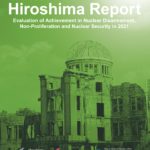Hiroshima Report 202319. Japan ■Non-Nuclear-Weapon State
| Nuclear Disarmament | 28 Points | Full Points 48 | 58.3% |
| Along with the other U.S. allies, Japan advocates the “progressive approach” toward a world without nuclear weapons, through incremental practical measures. Prime Minister Kishida attended the NPT RevCon and advocated the “Hiroshima Action Plan.” Japan also actively proposed nuclear risk reduction. It has not signed the TPNW. It has increased reliance on extended (nuclear) deterrence. It is reported that Japan requested the U.S. not to adopt a policy of no first use or sole purpose of nuclear weapons. Japan has proactively engaged in nuclear disarmament, particularly for promoting entry into force of the CTBT (such as hosting the first the High-Level Meeting of the Friends of the CTBT), and undertaking disarmament and non-proliferation education as well as cooperation with civil society. Japan participated in the IPNDV. | |||
| Nuclear Non-Proliferation | 53 Points | Full Points 61 | 86.9% |
| Japan has acceded to the IAEA Additional Protocol, and has applied the integrated safeguards. It has proactively engaged in nuclear non-proliferation, including the establishment of solid export control systems and conducting outreach activities. It submitted a report based on the Guidelines for the Management of Plutonium to the IAEA. | |||
| Nuclear Security | 29 Points | Full Points 38 | 76.3% |
|
Japan ratified all nuclear security related conventions and established a national implementation system for A/CPPNM. Japan returned 75 kg of HEU to the U.S. in 2022, as well as converted HEU fueled reactors to LEU fueled reactors. They have accepted an IPPAS follow-up mission in 2018 and decided to submit a request to the IAEA to accept the IPPAS mission in 2025. Japan is one of the few countries that have made part of the IPPAS mission report publicly available. They participate in a number of INFCIRC initiatives and continue to contribute to the NSF. |
|||





